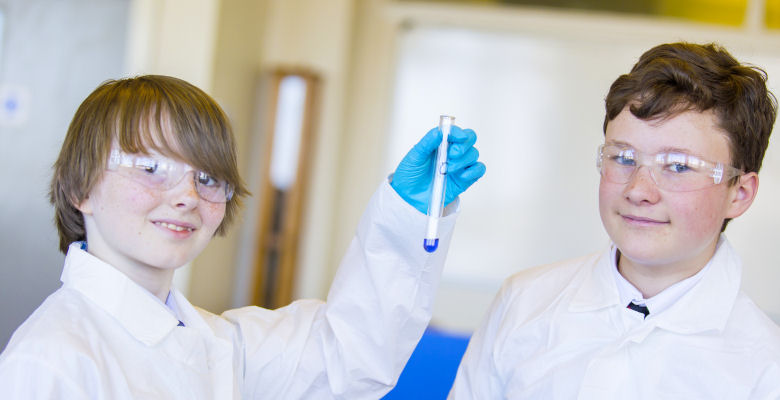Salters’ Festival of Chemistry

There is a national need to drive more young people towards Science, Technology, Engineering and Maths (STEM) subjects and careers to bridge the skills gap in the subjects. There is also a concern that STEM subjects and careers can be dull and boring when really they are broad and varied. The interesting elements are certainly evident at the Salters’ Festival of Chemistry which takes place annually at LJMU’s School of Pharmacy and Biomolecular Sciences.
In partnership with The Salters' Institute and The Royal Society of Chemistry, this year’s Festival saw 60 students, 11-13 years olds, from 15 schools in the (North West region) taking part in a competitive, hands-on, practical activity, "The Salters’ Challenge" - "Trouble at the Salt Mine!" in which they used their practical chemistry skills.
The mystery was based around an imaginary murder and the pupils had to examine the forensic evidence taken from the imaginary crime scene to help identify the culprit. The students were asked to identify the white powder found at the crime scene using chemical analysis and compare that with the white powder found on the shoes of each of the six suspects. The white powders were in fact salts that are commonly found around the house such as sodium chloride and calcium sulphate. One of the other experiments involved matching the sample of ink found at the crime scene with the samples of ink contained in the pens of the six suspects.
In the afternoon, they competed in the "University Challenge", a practical activity, using their knowledge and science skills to solve the problem of controlling the time of a chemical reaction.
The Salters' Festivals of Chemistry are an initiative of The Salters' Institute, whose aim is to promote the appreciation of chemistry and related sciences amongst the young, and to encourage careers in the teaching of chemistry and in the UK chemical and allied industries.
Daniel Boyle, a teacher of science at Cardinal Heenan Catholic High School said:
"This is a great opportunity to give our students an idea of what it’s like to study science at university. The style of the competition promotes independent learning and enhances practical training and skills. They can questions about careers in chemistry and are often surprised at just how many options there are."
Thomas Clark is a Teacher of Science at All Saints. They are also taking part in Chemistry for All, an LJMU and Royal Society of Chemistry (RSC) £150,000 outreach project aimed at understanding the impact of longitudinal interventions in chemistry on target pupils from widening participation backgrounds. Thomas added:
"Working with Liverpool John Moores University and using their labs and apparatus is brilliant for the students. I studied here and was encouraged to pursue a career in teaching chemistry."
Matthew Woods, a student at Cardinal Heenan Catholic High School commented:
"Solving the crime was really interesting. I liked the competition side and the independent learning. I want to be in the police and it was great to see that chemistry could fit into that career."
Robert McNally, also from Cardinal Heenan Catholic High School, wants to be a doctor. He added:
"It was good to learn about chemistry in a new way and it felt like work experience being in a university. We’d looked at universal indicators before but this was a different way of understanding it and ended up being fun."
The Festival at LJMU is one of a series of 49 Festivals which are taking place at Universities and Colleges throughout the UK and the Republic of Ireland between March and June 2015.
The School of Pharmacy and Biomolecular Sciences provides practical, hands-on learning. See the full range of courses here
Pictured: Matthew Woods and Robert McNally test samples using a universal indicator to see if they are acidic, basic or neutral in order to solve the competition crime.


.png?la=en&h=200&mw=800&w=360&hash=2A35D5DE45585187D3951C65EBC84733)